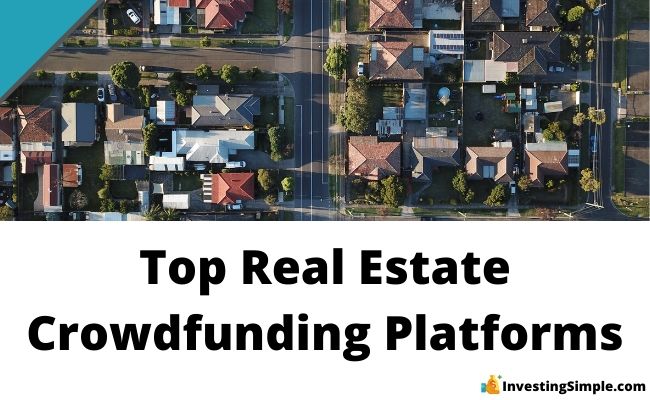





Investing Simple is affiliated with Fundrise, and we earn commissions for this endorsement of Fundrise.
Investing in real estate offers numerous benefits, including portfolio diversification and potential passive income. However, traditional property investment often requires substantial capital, with down payments typically ranging from 20% to 30% of the property's value.
Additionally, the current interest rate environment has made borrowing more expensive, further challenging prospective investors.
Real estate crowdfunding platforms have emerged as a solution to these barriers. By allowing investors to pool their resources, these platforms provide access to real estate opportunities that might otherwise be out of reach. In this article, we will explore 13 top real estate crowdfunding platforms, highlighting their unique features and benefits.
| Platform | Minimum Investment | Investor Eligibility | Investment Focus | Platform Highlights |
|---|---|---|---|---|
| Fundrise | $10 | Non-accredited | Diversified portfolios | Offers eREITs and eFunds; low entry barrier; suitable for various investment strategies. |
| RealtyMogul | $5,000 | Non-accredited | Commercial properties | Provides access to REITs and private placements; focuses on income-producing assets; monthly distributions. |
| EquityMultiple | $5,000 | Accredited | Commercial real estate | Offers equity, preferred equity, and senior debt investments; diverse opportunities across markets. |
| CrowdStreet | $25,000 | Accredited | Commercial properties | Connects investors with vetted project developers; options to invest in individual properties or managed funds. |
| Arrived Homes | $100 | Non-accredited | Single-family rentals | Specializes in single-family homes; allows fractional ownership; tenants are co-owners. |
| Yieldstreet | $10,000 | Primarily accredited | Multiple asset classes | Provides access to various alternative investments, including real estate; focuses on income generation. |
| Groundfloor | $100 | Non-accredited | Real estate loans | Allows fractional investing in real estate debt; low minimum investment; automated investment options. |
| DiversyFund | $500 | Non-accredited | Multifamily properties | Focuses on value-add multifamily real estate; no management fees; aims for long-term growth. |
| First National Realty Partners (FNRP) | $50,000 | Accredited | Commercial properties | Specializes in grocery-anchored retail centers; targets institutional-quality assets. |
| ArceTrader & FarmTogether | $10k-$15k | Mostly Accredited | Farmland | Offers investors exposure to farmland and agricultural land; Mostly long term strategies and opportunities. |
| 1031 Crowdfunding | Varies | Accredited | 1031 exchange offerings | Provides Delaware Statutory Trust (DST) investments suitable for 1031 exchanges; focuses on tax deferral strategies. |

The minimum to begin investing is just $10 with the Starter Portfolio.
More importantly, you do not need to be an accredited investor. What really landed Fundrise in our #1 spot is the fact they have been around since 2010 and have a solid track record over that time. Some of the other platforms are still quite young and could be perceived as a riskier investment.
Fundrise has portfolios for growth and income investors, among others. This makes it a suitable option for a variety of investment strategies.

Income investors are looking for consistent dividends or distributions from their investments.
RealtyMogul delivers that through their Realty Mogul Income REIT which pays monthly distributions. These can be reinvested back into the REIT or deposited directly to a bank account.
This REIT is available to all investors. The $5,000 minimum is higher than other alternatives. However, you do not need to be an accredited investors.

This platform provides access to a variety of real estate investment opportunities across different markets.
To date, EquityMultiple has returned over $430 Million in total distributions to investors via the platform. Unlike many other real estate platforms, EquityMultiple offers investments in equity, preferred equity, and senior debt.
While the cited minimum is $5,000, many deals require $10k-$30k
However, EquityMultiple is available to accredited investors only.

Fundrise was founded in 2010, giving it a longer operating history compared to newer platforms.
Fundrise is an online real estate company that allows regular investors to participate in private commercial and residential properties through a pooled investment platform.
Here's a rundown of the platform:
Click here to view Fundrise investments!
Investors can buy shares of Fundrise's funds by selecting one of their four strategies: Fixed Income, Core Plus, Value Add or Opportunistic.
Each one of these strategies has different goals and potential risks, and this provides a wide array of options for their diverse clientele base.
The company determines the mix of eREITs and eFunds in each plan, along with the underlying properties. There are Advanced and Premium account levels that offer access to more real estate projects and additional features.
Fundrise opens up real estate investment opportunities to those who are not traditionally considered wealthy investors, as you do not need to be an accredited investor. In addition, the minimum investment to get started is just $10.
So far, over 2.1 Million people have joined Fundrise as investors via the platform.

RealtyMogul formally launched in 2013, giving it a slightly shorter track record compared to other platforms.
RealtyMogul is an online platform that enables both non-accredited and accredited investors to invest in commercial real estate.
They offer two main investment options: Public Non-Traded REITs and Private Placements.
The REIT investment opportunities are open to both accredited and non-accredited investors:
Click here to view RealtyMogul investments!
Private placements, available to accredited investors only, typically involve single property or small portfolio deals with varying investment minimums and a two to 10-year time horizon. This also includes opportunity zone investments.
To date, RealtyMogul has seen a total of $1.1 Billion invested through the platform. This is spread out across over 290,000 members who have joined the platform.

EquityMultiple is an online real estate platform designed for accredited investors to engage in professionally managed commercial real estate ventures.
This platform provides access to a variety of real estate investment opportunities across different markets. Unlike many other real estate platforms, EquityMultiple offers investments in equity, preferred equity, and senior debt.
EquityMultiple blends crowdfunding and traditional real estate investing, allowing investors to grow their wealth through avenues like self-directed IRAs, trusts, entities, and joint accounts.
To date, EquityMultiple has returned over $430 Million in total distributions to investors via the platform.
Click here to view EquityMultiple investments!
Despite being available to accredited investors only, EquityMultiple has a low minimum investment of just $5,000.

CrowdStreet is an online commercial real estate investing platform that launched back in 2014. CrowdStreet simplifies the process of investing in commercial real estate projects across the United States.
It connects individual accredited investors with vetted project developers, making it easier for investors to access commercial real estate opportunities that they might not have access to on their own.
CrowdStreet carefully reviews developers, including conducting background and reference checks, to ensure the quality and legitimacy of the projects listed on the platform. This initial screening helps save time for investors who may not have the expertise or resources to perform such evaluations themselves.
However, investors are still encouraged to conduct their own due diligence on both the developers and the projects to understand the potential risks involved.
Click here to view CrowdStreet investments!
Here's how CrowdStreet works:
The minimum investment amount varies depending on the specific offering and is determined by the project sponsor. In general, most individual projects and real estate funds available on CrowdStreet require a minimum investment of $25,000.

This segment is sponsored by Arrived Homes.
Arrived Homes offers investors an opportunity to participate in real estate without the headache.
Like the other platforms in this list, Arrived Homes strives to open the door of real estate to everyone, but their offering is unique in a few ways.
Arrived specializes in single family real estate all across the country. The company carefully vets real estate markets to determine which ones have the most income producing potential. Then, they find the neighborhoods in those markets with the most potential and purchase properties that meet their criteria.
Each property is then placed in a Series LLC where investors can purchase shares of the property. Arrived qualifies as a REIT, or real estate investment trust, and is taxed accordingly.
Here's how it works:
Another aspect that makes Arrived so unique is that each tenant is a co-owner of the property, meaning that interests in the property are aligned.

Groundfloor is a real estate crowdfunding platform that offers short-term, high-yield debt investments in residential properties. Unlike many platforms, Groundfloor is open to both accredited and non-accredited investors, with a minimum investment of just $100.
Investors can choose specific projects to fund, typically involving loans to real estate developers for property renovations or flips. These loans usually have terms ranging from 6 to 12 months, providing quicker liquidity compared to traditional real estate investments.
Groundfloor's unique approach allows investors to diversify across multiple projects with minimal capital, making it accessible for those new to real estate investing. According to their site, they've averaged an 11.5% return since launch in 2024.

DiversyFund operates a public, non-traded Real Estate Investment Trust (REIT) that focuses on multifamily properties. With a minimum investment of $500, it's accessible to non-accredited investors seeking to diversify their portfolios with real estate assets.
The platform employs a value-add strategy, acquiring underperforming properties, renovating them to increase value, and holding them for appreciation. Investments are illiquid, with a typical holding period of four to six years, during which investors cannot sell or transfer their ownership.
DiversyFund handles all aspects of property management, allowing investors to participate passively.

AcreTrader specializes in farmland investments, allowing investors to purchase shares in agricultural land. The platform conducts thorough due diligence on each property, assessing factors like soil quality, water access, and local market conditions.
Investments are generally held for 5 to 10 years, during which investors earn income from lease payments made by farmers. AcreTrader requires a minimum investment that varies by property, typically starting around $10,000.
This platform is best suited for accredited investors seeking diversification into agricultural real estate.

FarmTogether offers accredited investors the opportunity to invest in U.S. farmland. The platform provides various investment options, including crowdfunded offerings, sole ownership, and 1031 exchange deals. Minimum investments start at $15,000, and the typical holding period ranges from 5 to 12 years.
Investors earn returns through annual rental payments and potential land appreciation. FarmTogether focuses on properties with strong water resources and favorable climate conditions, aiming for stable, long-term returns.

Trinity Investors is a private equity firm specializing in real estate and business investments. They offer accredited investors opportunities to participate in various real estate projects, including multifamily, office, and industrial properties.
Trinity emphasizes strategic partnerships and thorough market analysis to identify high-potential investments. Investment minimums and terms vary by project, and the firm focuses on delivering consistent returns through a combination of income and capital appreciation.

Yieldstreet is an alternative investment platform offering access to asset-backed investments across various sectors, including real estate, art, legal finance, and marine projects. With a minimum investment of $2,500, Yieldstreet caters to both accredited and non-accredited investors.
The platform focuses on debt investments with relatively short durations, often ranging from 6 months to 5 years. Yieldstreet aims to provide diversification opportunities beyond traditional markets, with target annual returns typically between 8% and 20%.

FNRP specializes in acquiring and managing grocery-anchored retail centers. They offer accredited investors the chance to invest in commercial real estate with a focus on properties that provide essential goods and services, aiming for stability and consistent returns.
FNRP handles all aspects of property management, from acquisition to leasing, allowing investors to participate passively. Investment minimums and terms vary by offering, and the firm emphasizes transparency and regular investor communications.

1031 Crowdfunding is a platform that facilitates 1031 exchange transactions, allowing investors to defer capital gains taxes by reinvesting proceeds from the sale of a property into a like-kind investment. The platform offers Delaware Statutory Trust (DST) properties as replacement options, providing passive income opportunities without the hassles of property management.
Minimum investments typically start at $25,000, and offerings are primarily available to accredited investors. 1031 Crowdfunding provides a streamlined process for investors seeking tax deferral and diversification in real estate holdings.
For those who are not familiar with real estate crowdfunding, let’s go ahead and cover some of the basics.
You might be wondering why all of these platforms are relatively new with limited operating history. This is because crowdfunded real estate is a new investment opportunity that came around in 2012.
The Jumpstart Our Business Startups or JOBS Act passed under the Obama administration. The point of this law was to loosen restrictions on small businesses, particularly by easing securities regulations.
Prior to this law passing, it was illegal for companies to use crowdfunding to issue securities. Now, it is perfectly legal to raise money in this fashion!
Crowdfunding is a relatively new way to finance a project or venture.
Born out of the internet era, investors from all over can pool money together back a project or idea.
A lot of the private real estate investments are reserved for accredited investors only. A number of these new crowdfunded real estate investments are too.
No, this isn’t some exclusive club that you didn't get the the invite to. This is a federal regulation.
An accredited investor is someone who is allowed to be involved with investments that may not be registered with financial authorities.
Governing authorities like the SEC and FINRA heavily regulate public investments that are available to average retail investors.
In order to be an accredited investor, you must meet either of these two requirements:
Based on somewhat recent changes to accredited investor requirements, financial professionals with Series 7, 65 or 82 licenses also qualify.
A lot of people are wondering why you would go through the trouble of investing through a crowdfunded real estate platform when you can just go out and buy a REIT.
If you aren’t familiar, a REIT is a real estate investment trust. It is a company that owns and operates income producing real estate. This could be residential, commercial or industrial real estate ranging from office buildings to cell towers.
REITs trade on major stock exchanges just like the stocks we know and love. You can buy a share of a REIT just as easily as a share of Apple.
So the question becomes, why not just buy a REIT if you are looking to diversify? Here are a few reasons why.
There are some instances where a REIT makes more sense than a crowdfunded real estate investment.
When real estate investments are discussed, you will often hear about debt and equity investments.
It is important to understand the difference before deciding on a crowdfunded real estate investment. You want to make sure this type of investment aligns with your goals and investment objective.
With a debt investment, you are loaning funds to someone who owns real estate or is purchasing real estate. It is just like going to the bank for a mortgage. However, instead of a bank it is a group of private real estate investors backing the loan.
In the past, this was a small group of high net worth individuals who would have access to these deals. Now, thanks to crowdfunding and the JOBS Act, average investors can get in on the action.
Equity investors have an ownership interest in the property. As a result, they stand to gain if there is any upside and lose if there is any downside. Equity investors share the upside if the property appreciates and share the cash flows if the building is producing income.
Consider a flip for example.
Equity investors pool their money together to buy a number of townhouses in a hot real estate market. They secure a loan from the debt investors mentioned above. They upgrade the townhouses over the next year and hold onto them for an additional three years, renting them out.
If the properties are producing cash flow, the equity investors share the profits. During this entire duration, the equity investors are paying interest on the loan from the debt investors.
After the fourth year, they sell the townhouses for a significantly higher price. All of the equity investors would share the upside from the asset appreciation.
Investing in real estate crowdfunding offers potential rewards but also comes with inherent risks. It's crucial to be aware of these before committing capital. Key considerations include:
Given these risks, it's essential to conduct thorough due diligence on both the crowdfunding platform and the specific real estate projects before investing. Understanding the potential downsides can help in making informed decisions and aligning investments with individual risk tolerance and financial goals.